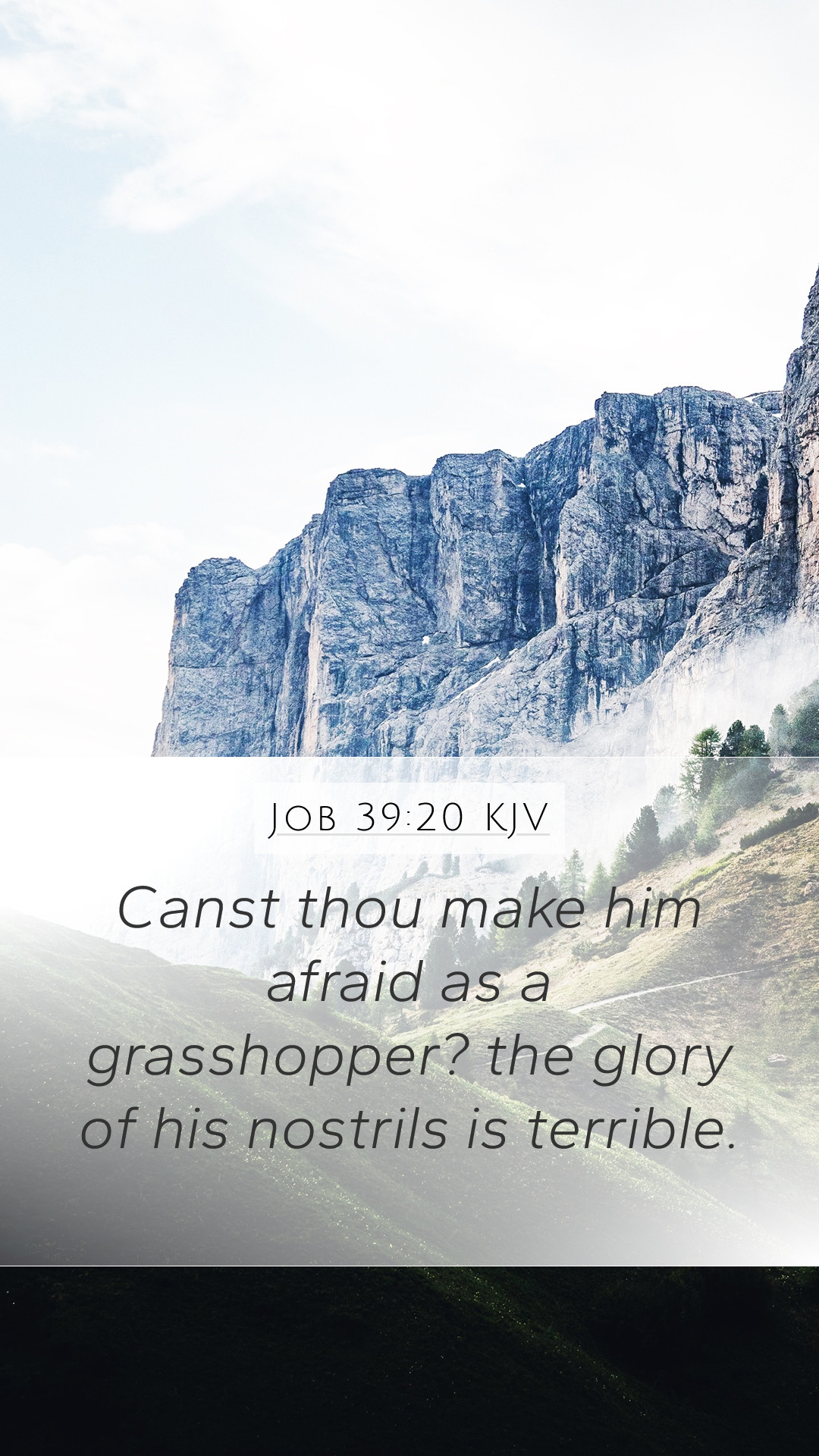Old Testament
Genesis Exodus Leviticus Numbers Deuteronomy Joshua Judges Ruth 1 Samuel 2 Samuel 1 Kings 2 Kings 1 Chronicles 2 Chronicles Ezra Nehemiah Esther Job Psalms Proverbs Ecclesiastes Song of Solomon Isaiah Jeremiah Lamentations Ezekiel Daniel Hosea Joel Amos Obadiah Jonah Micah Nahum Habakkuk Zephaniah Haggai Zechariah MalachiJob 39:20 Meaning
What is the meaning of Job 39:20?
Canst thou make him afraid as a grasshopper? the glory of his nostrils is terrible.
Job 39:20 Bible Verse Meaning
Understanding Job 39:20
Job 39:20 states, "Shall a trumpet be blown in the city, and the people not be afraid? Shall there be evil in a city, and the Lord hath not done it?" This verse forms part of God’s discourse with Job, highlighting the relationship between divine action and human awareness, particularly in the context of disaster and fear.
Bible Verse Meanings
The meaning of this Bible verse can be gleaned through a careful examination. Below are interpretations drawn from notable public domain commentaries:
- Matthew Henry: Henry emphasizes the rhetorical nature of God’s questions. He suggests that just as a trumpet signals a call to arms or an alarm, the actions of God in nature and human affairs awaken a response in humanity. It reflects God's sovereignty over events and His role in orchestrating circumstances that provoke fear or urgency among people.
- Albert Barnes: Barnes elaborates on the theme of divine agency in the evils faced by societies. He argues that the reference to 'evil' implies calamity, with God being ultimate in control. The verse serves to instill a sense of reverence, indicating that nothing happens without God's knowledge or directive, asserting God's omnipotence in global affairs.
- Adam Clarke: Clarke provides insight into the societal implications of the trumpet metaphor. He suggests that just as the sound of the trumpet cannot go unnoticed, so too should the manifestations of God's will. He argues that individuals and communities must recognize the signs of divine intervention, calling them to introspection and realization of their mortality and dependence on God.
Bible Verse Interpretations
As we delve deeper into this scripture, various interpretations emerge, reflecting on how they can be pertinent in Bible study groups and individual contexts:
- Divine Sovereignty: The notion that God governs all events, be they calamities or blessings, underpins this verse. Understanding Scripture often leads believers to recognize their vulnerability and reliance on God.
- Human Reaction: This verse incites a discussion about human responses to warnings. It prompts questions about moral awareness and the responsibility individuals have toward recognizing signs in their lifetimes.
- Fear of the Lord: The invocation of fear in the verse points to a broader theme in the Bible regarding the fear of God as a necessary respect and acknowledgment of His power.
Biblical Exegesis
When we consider the historical context of this passage, it becomes evident why Job is being questioned in this manner. The events unfolding in Job's life are profound, and God’s challenges toward him serve as a crucial part of the narrative:
- Context of Suffering: Job’s discourse on suffering leads to this divine response on God’s omnipotence, reaffirming that His plans are larger than human suffering and life experiences.
- God's Questions: The questions posed invoke a deeper understanding of God’s nature rather than simply providing answers, encouraging individuals to ponder their relationship with divine power.
Bible Study Insights
This verse provides rich insights for Bible study lessons, particularly in understanding how to interpret Bible verses effectively:
- Application in Daily Life: The acknowledgement of God’s presence in life events can affect how people respond to adversity or calamity, encouraging them to rely on His wisdom.
- Encouragement for Reflection: When studying this verse, it's beneficial to take time reflecting on personal experiences where God’s presence was evident in times of fear or trouble.
Significance of the Verse
The significance of Job 39:20 extends beyond mere words; it calls believers to a profound understanding of God’s role in human affairs:
- Recognizing God’s sovereignty encourages humility and reliance on divine wisdom during tumultuous times.
- It serves as a reminder that fear can lead to growth when directed toward reverence for God, thus providing a strong foundation for faith and resilience.
Cross References
This verse resonates with several other scriptures that explore God’s power and human reaction to calamity:
- Amos 3:6: "Shall a trumpet be blown in the city, and the people not be afraid?"
- Isaiah 45:7: "I form the light, and create darkness: I make peace, and create evil: I the Lord do all these things."
- Proverbs 1:7: "The fear of the Lord is the beginning of knowledge: but fools despise wisdom and instruction."
Conclusion
In conclusion, Job 39:20 offers a rich tapestry of meaning through its examination of God’s sovereign role in human affairs and the appropriate human response to divine signals. By studying this verse and its implications, learners can deepen their Bible verse understanding and enhance their Bible study insights, providing important tools for navigating life's complex challenges.


